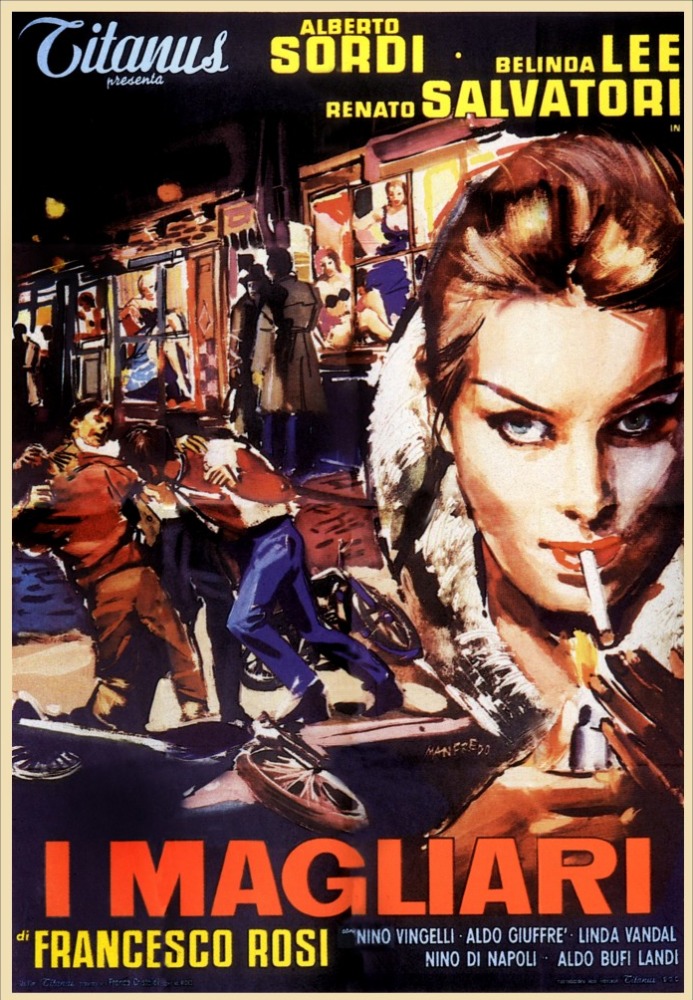A young Francesco Rosi, directing only his second feature-length film, proves that he is already a master. I magliari is built on a foundation of neorealism, but it is also filled with bitter comedy and influenced by noir cinema (enhanced by Gianni Di Venanzo’s wonderful black and white photography). The film outlines a dense, powerful portrait of an epoch marked by huge transformations. Inside a group of unscrupulous crooks and deluded workers who have emigrated to Germany, we discover a darker side to the optimistic economic zeal reshaping European destiny in those years. Their stories mirror a historical context marked by deep contradictions between ostentatious wealth and the art of getting by, between euphoria and a sense of hopelessness, between capitalism and cheating, between North and South, between human comprehension and fierce social criticism. As Pier Paolo Pasolini said, Alberto Sordi’s comedy “springs out from the conflict that exists within men in the contemporary multi-coloured yet homogenised society, whose infantilism doesn’t produce ingenuity, naivety, goodness and solidarity, but selfishness, cowardice, opportunism and cruelty.”
Mario, a young worker from Grosseto who has emigrated to Hanover is down on his luck. He meets Totonno from Rome, who introduces him to the world of the “magliari” (crooks and conmen who deal in fabrics of extremely poor quality). Totonno leaves the gang of Neapolitans he has been working for, in order to start his own business in Hamburg selling fabrics produced by German businessman Mayer. Mario follows him and falls in love with Mayer’s frivolous wife. For him and Totonno, the new adventure will end in total failure.
A young Francesco Rosi, directing only his second feature-length film, proves that he is already a master. I magliari is built on a foundation of neorealism, but it is also filled with bitter comedy and influenced by noir cinema (enhanced by Gianni Di Venanzo’s wonderful black and white photography). The film outlines a dense, powerful portrait of an epoch marked by huge transformations. Inside a group of unscrupulous crooks and deluded workers who have emigrated to Germany, we discover a darker side to the optimistic economic zeal reshaping European destiny in those years. Their stories mirror a historical context marked by deep contradictions between ostentatious wealth and the art of getting by, between euphoria and a sense of hopelessness, between capitalism and cheating, between North and South, between human comprehension and fierce social criticism. As Pier Paolo Pasolini said, Alberto Sordi’s comedy “springs out from the conflict that exists within men in the contemporary multi-coloured yet homogenised society, whose infantilism doesn’t produce ingenuity, naivety, goodness and solidarity, but selfishness, cowardice, opportunism and cruelty.”
Mario, a young worker from Grosseto who has emigrated to Hanover is down on his luck. He meets Totonno from Rome, who introduces him to the world of the “magliari” (crooks and conmen who deal in fabrics of extremely poor quality). Totonno leaves the gang of Neapolitans he has been working for, in order to start his own business in Hamburg selling fabrics produced by German businessman Mayer. Mario follows him and falls in love with Mayer’s frivolous wife. For him and Totonno, the new adventure will end in total failure.
